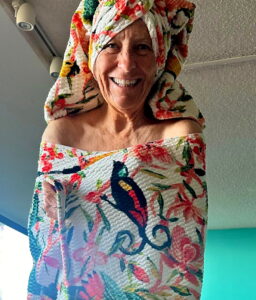December 13, 2024
Last month, I traveled to Indonesia to snorkel Raja Ampat, meaning Four Kings. The kings of the name are four islands ruled, according to local mythology, by four kings. Because the islands lie in the heart of the Coral Triangle, the global epicenter of marine diversity, Raja Ampat is a world-famous dive and snorkel destination. As it should be. With deliciously warm water hosting over 600 hard corals, and 3,000 kinds of reef fish, it’s snorkeling heaven.
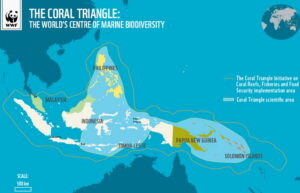
The white area is Indonesia, a nation of over 17,000 islands. I added the Raja Ampat area in the center, and Bali and Jakarta for reference. WWF image.
When I reminisce about this excellent trip, though, it’s not a marine animal that pops into my mind first. It’s a bird. And I’m not even a birder. I like all birds, from albatrosses to doves to chickens. But I don’t have a list of species I’ve seen, I don’t care much about their official names, and I’m not fond of binoculars.
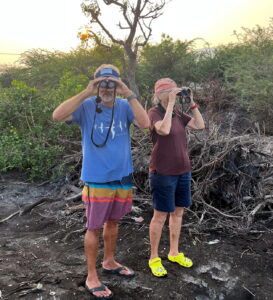
I can be persuaded to use binoculars but friends have to remind me to bring them. Here Craig and I are looking at a plover (below). Birder friend Martha Brown took this picture to document our use of binoculars.
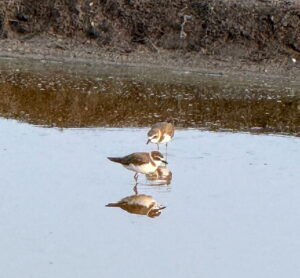
These birds at a Bali water treatment area are Javan plovers (my best guess.) Hawai’iʻs kōlea are one of about 40 plover species in the world. Susan Scott photo.
That’s why, when several birders on our Raja Ampat liveaboard boat arranged a side trip with a local bird guide, I passed. The hike sounded too hot and too hard for me. When Craig relayed my opt-out message, however, our trip leader arranged for a vehicle to take us into the forest. I had to go.
After several miles of bumpy road, we walked a rough path to a blind made of black cloth with cutouts for big enough for one human face each.
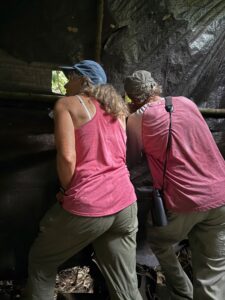
Our long-time travel companions and birder friends, Martha Brown and Breck Tyler, in the Wilson’s Bird-of-Paradise blind. This is the male bird’s current display territory. ©Susan Scott
Not knowing what we were looking for, I peered through my opening. Just when I was wondering how long I had to stand there, a bird appeared, looking as if it had flown out of a Pixar film. “It’s a Wilson’s Bird-of-Paradise,” Breck, an ornithologist, whispered in my ear, figuring I didn’t likely know the bird’s name. I didn’t. But I do now and will forever be a birds-of-paradise fan.
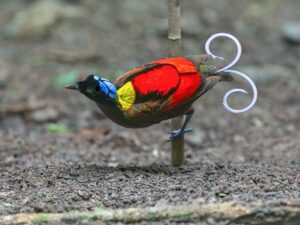
Wilson’s Bird-of-Paradise, Diphyllodes respublica, © Chris Venetz, Ornis Birding Expeditions. From Birds of the World, Cornell Lab, Macaulay Library.
The bird-of-paradise family consists of 45 species in Indonesia, New Guinea and Australia. A good overview and photos of these astonishing birds is the Cornell Lab’s birds-of-paradise project. Wilson’s Bird-of-Paradise lives on only two islands in the world, and we were on one, Waigeo, one of Raja Ampat’s four.
David Attenborough’s BBC team took the first-ever videos of the bird in 1996. Amazingly, I got some too. Below is one:
My one-week-old iPhone 16 Pro Max suddenly made it worth its hefty price. In dim forest light on maximum zoom, the phone’s camera shot acceptable stills and videos.
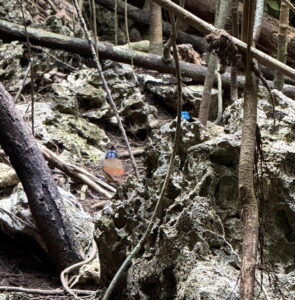
When a female dropped by to check out the singing male, I got her picture too. She’s in the foreground looking at the male (blue head showing.)
My photos aren’t BBC quality by any means, but they’re phone treasures that remind me how lucky I am to have seen a real bird-0f-paradise in the wild. I’ll never look at a bird-of-paradise flower here in Hawaiʻi again without remembering these stunning birds.
My rare-bird-sighting experience had a surprise epilogue waiting for me back home. After a shower, I reached for the bath towels I bought last year at Target because of their bright colors. I thought the bird designs were an artist’s fantasy. But no. The designer had chosen Wilson’s Bird-of-Paradise to brighten bathrooms.
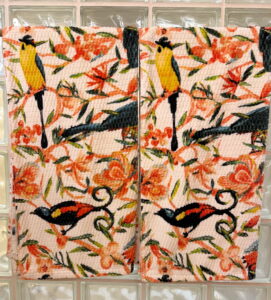
I don’t know the name of the towels’ upper bird with the yellow breast. I’m hoping a birder will enlighten me.
Thank you, Craig and my Raja Ampat companions, for that special ride into the forest. My showers will never be the same.
